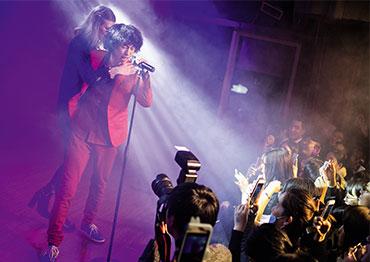Bai Xiao first met Pang in a recording studio in the autumn of 2015. A singer and published poet, Bai loves folk, particularly the work of Leonard Cohen and Bob Dylan. Bai told NewsChina that it was Pang’s humor and lyrics that first resonated with him, and soon they began collaborating.
In 2016, Bai helped Pang book a 24-show tour of small venues in major cities across China. A poster from the tour shows Pang in a fedora and white shoes doing Jackson’s signature toe stand.
The first show in Hangzhou, Zhejiang Province saw more than 240 people. But as the tour continued, audiences shrank.
The low point came in March 2017 at a show in Anyang, Henan Province, where only seven people showed up. The next day, media outlets ran a scathing story with the headline “Seven concertgoers, 14 security guards.”
Pang had no choice but to face a bleak reality: His fame disappeared as quickly as it came.
He returned to Ningqiang County, living in a small house next to his family. When not performing, Pang helped his parents on the farm.
In 2020, Taiwanese singer-songwriter Kenji Wu made a documentary about Pang’s life titled Have You Said Thank You with Tears. In one segment, Wu captures the singer working in his room, writing lyrics in an old notebook with a short pencil. On his desk are a laptop, empty beverage bottles and books. Among them is The Manuscripts of Vincent van Gogh.
Pang admits he has plenty of new songs but no money to produce them – he spent all his earnings on making recordings. “It took me 50,000-60,000 yuan (US$ 7,657-9189) to produce a single song,” Pang said in the documentary.
The musician also opens up to Wu about his inferiority complex. “To be honest, we [rural people] are underprivileged. We seem so rough and less refined compared with urban people. I’d be content if I was accepted as one of them,” Pang said.
Although Pang tried to conceal his origins, he was starkly honest in his songs. Since 2014, he has released an eight-track album Old Metal and four singles.
In them Pang reveals his own struggle of living and working in cities as a migrant worker. In “The Drifting Motorcycle,” Pang sings about how he gets injured in a motorcycle race with fellow workers at a construction site, “Spanish Bull” tells of his dream to become a Spanish matador and “Beggars Sleeping on the Street” recounts his bitter feelings of seeing child beggars in the cities.
None struck a chord like “The Skateboard Shoes.”
Like most artists around the world, Covid-19 put the brakes on Pang’s performance schedule. To make ends meet, he and Bai tried promoting a skate shoe brand through livestreaming. After several sessions, however, the two only managed to sell three pairs.
“Some of the comments were really cruel,” Bai told NewsChina. “One time Pang tried to sing a song during the livestream, when a comment popped up: ‘Forget about your music dreams. Go find some job in a factory.’”
Bai said the disappointment toward his music career, combined with his sudden fall from fame and merciless mockery, were ultimately too much for Pang. As his mental health deteriorated, Pang became increasingly aggressive and paranoid.
In the winter of 2019, he attacked Bai by trying to gouge his eyes out. Pang carried a knife on him at all times, in fear his friends and family were trying to murder him.
Pang was first hospitalized briefly in late 2020, where doctors diagnosed him with schizophrenia. He checked himself out after three days, saying he had a performance soon. Of course it was an excuse. There were no more shows to play.
Bai compares Pang to another tortured soul, Vincent van Gogh. “He is innocent, if not naïve. His biggest strength is that he is stubborn, but to a fault – sometimes he is too stubborn,” Bai said.

 Old Version
Old Version

